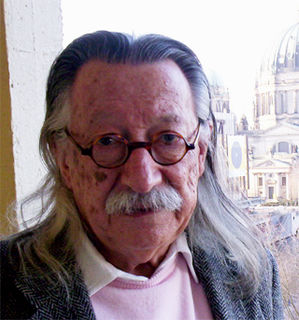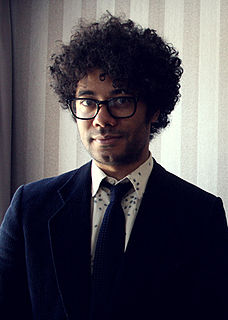A Quote by David Berlinski
Every computer divides itself into its hardware and its software, the machine host to its algorithm, the human being to his mind. It is hardly surprising that men and women have done what computers now do long before computers could do anything at all. The dissociation between mind and matter in men and machines is very striking; it suggests that almost any stable and reliable organization of material objects can execute an algorithm and so come to command some form of intelligence.
Quote Topics
Algorithm
Almost
Any
Anything
Before
Being
Between
Come
Command
Computer
Computers
Could
Dissociation
Divides
Done
Every
Execute
Form
Hardly
Hardware
His
Host
Human
Human Being
Intelligence
Itself
Long
Machine
Machines
Material
Matter
Men
Men And Women
Mind
Mind And Matter
Now
Objects
Organization
Reliable
Software
Some
Stable
Striking
Surprising
Very
Women
Related Quotes
Man is not a machine, ... although man most certainly processes information, he does not necessarily process it in the way computers do. Computers and men are not species of the same genus. .... No other organism, and certainly no computer, can be made to confront genuine human problems in human terms. ... However much intelligence computers may attain, now or in the future, theirs must always be an intelligence alien to genuine human problems and concerns.
The burgeoning field of computer science has shifted our view of the physical world from that of a collection of interacting material particles to one of a seething network of information. In this way of looking at nature, the laws of physics are a form of software, or algorithm, while the material world-the hardware-plays the role of a gigantic computer.
Although technology is proceeding at a dizzying pace, I believe that the human mind will always have control of itself. And since the human mind has a degree of infinity and imagination unlikely to be matched by a machine for a very, very long time, I don't think that we will become the machines of the machines.
I was really looking at computers as a way to understand the mind. But at M.I.T., my mind was blown by having a whole computer to yourself as long as you liked.I felt a surge of intellectual power through access to this computer, and I started thinking about what this could mean for kids and the way they learn. That's when we developed the computer programming language for kids, Logo.
At the age of 5, when I was in kindergarten, I often used to pass by the computer labs and see students doing work on computers. I realized that calculation, which would take us a long time to do, can be done in less than a second with the help of computers. So that is how my interest in computers began.
The mind is a mechanism. It has no intelligence. The mind is a bio-computer. How can it have any intelligence? It has skill, but it has no intelligence; it has a functional utility, but it has no awareness. It is a robot; it works well but don`t listen to it too much because then you will lose your inner intelligence. Then it is as if you are asking a machine to guide you, lead you. You are asking a machine which has nothing original in it.
Now, ideas are the raw material of progress. Everything first takes shape in the form of an idea. But an idea itself is worth nothing. An idea, like a machine, must have power applied to it before it can accomplish anything. The men who have won fame and fortune through having an idea are those who devoted every ounce of their strength and every dollar they could muster to putting it into operation. Ford had a big idea, but he had to sweat and suffer and sacrifice to make it work.
As computer intelligence gets better, what will be possible when we interface our brains with computers? It might sound scary, but early evidence suggests otherwise: interfacing brains with machines can be helpful in treating traumatic brain injury, repairing spinal cord damage, and countless other applications.
With both people and computers on the job, computer error can be more quickly tracked down and corrected by people and, conversely, human error can be more quickly corrected by computers. What it amounts to is that nothing serious can happen unless human error and computer error take place simultaneously. And that hardly ever happens.



































